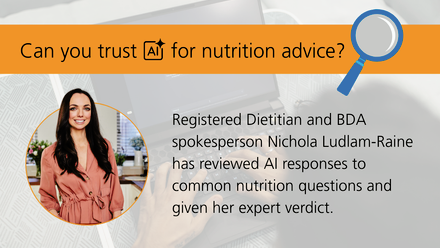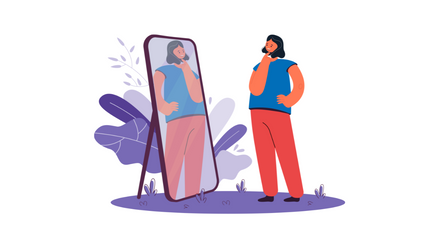In this article, Registered Dietitian, Emma Townsin, discusses intuitive eating.
Diet Fatigue: When the thought of going through another diet feels unbearable, but the thought of giving up food rules also makes you feel uncomfortable. When both dieting and non-dieting wears you down. When it feels like you’re in a never-ending battle to find a peaceful relationship with food, amid ever-conflicting nutrition advice.
For those of us struggling with diets, the best approach might be to ditch those food rules altogether, get back in touch with your body, and finally feel at peace through Intuitive Eating, the act of eating intuitively.
You don’t need willpower
When a diet “fails” you’re led to believe that it’s all your fault, that you’re not trying hard enough, that you have no control, that you need more willpower.
When in reality, the reason diets fail the vast majority of the time is simply a biological response to the deprivation your body has been put through.
You can’t willpower your body out of strong biochemical processes.
In fact, we know why diets fail. We know about the underlying biochemical changes that occur when hunger is ignored. A diet is a means of control over your body. Control makes your body feel threatened, and this threat changes the way your body processes energy and nutrients.
What happens when you diet
When we restrict food there’s only so long that our bodies will work alongside us, as chemical messages are sent around our bodies to our brains to regulate our eating. If a shortage of food is signalled, strong biochemical adaptations occur so that food takes centre stage. After the honeymoon phase of the diet wears off, these are some ways our bodies might respond:
- A sluggish metabolism: If calorie intake is inconsistent, your body will save all the energy it can. This can leave you feeling sluggish with low energy and difficulty concentrating and ultimately regaining weight.
- Obsessive food thoughts: If you can’t get food off your mind, it’s because your body needs more. This is actually a natural hunger signal. Just like when your bladder is full and all you can think about is finding a bathroom, when we are really hungry, all we can think about is eating. Even if you don’t notice the grumbling stomach, you won’t be able to ignore the constant food thoughts.
- Increased desire for high calorie foods: Energy is your most important need so if there’s not enough coming in, you will naturally crave calorie dense foods (these are likely the exact foods many are trying to remove when dieting).
- Emotional eating. If your body does not trust that food will be provided when needed, your body is not going to guide you to stop eating at a comfortable level. This leads to that “out-of-control” experience around food and can leave you feeling physically and emotionally uncomfortable.
Developing body trust
To eat intuitively means to listen out for and trust the sensations inside your body to naturally guide your eating.
For example, imagine a time when you have a full bladder, and you feel sensations in your body to alert you. Now imagine there is no bathroom available, the feelings become stronger until all you can think about is finding a bathroom. Our hunger sensations also start out with mild - even pleasant - hunger cues, but many of us have been conditioned not to trust them.
Our world dictates what type of foods we should be eating, how much we should be eating and when we should be eating. These messages conflict with our body’s innate signals, leaving us to choose between the two and decide which messages we believe are correct.
There is a common fear that if we listen to our bodies and eat at mild hunger, we will eat all the time and our weight will become uncontrollable. Really, if we give in to our hunger, what we find is the exact opposite.
When emotions drive your eating
At times, our drive toward food seems to defy even the notion of our hunger. It can often feel like an emotional experience.
We are very complex creatures, and eating reflects this complexity. Eating is driven by more than just an instinctive response - it’s also often driven by pleasure, social connection, celebration or coping with difficult emotions. Eating is very often driven by our emotions, whether positive or negative.
The complexity of the human experience means that, to feel good around food, we must connect with food in a variety of ways. Food is not simply fuel. Reconnecting with the sensations in our bodies supports us to understand when food is helpful or, perhaps, not so helpful, and to feel more connected to and at peace with the eating experience even during emotional moments.
How to ditch food rules, without losing control
If you find yourself stuck between dieting and out-of-control eating, your path to freedom lies in developing a stronger connection between mind and body.
Intuitive Eating is a powerful framework combining mindfulness around food and body, nutrition counselling, and a psychological approach called Cognitive Behavioural Therapy (CBT). This combination supports you to let go of guilt and shame around food, develop connection and trust with your body, and feel empowered in your food choices.
This type of approach is shown to reduce binge and emotional eating, as well as improving health markers and overall quality of life.
To get started today and at your own pace, here are some steps you can take:
- Allow hunger: Give yourself permission to eat when you feel hungry. Waiting as long as possible to eat is no achievement, as it usually leads to strong cravings and eating more than is comfortable for your body. Developing trust in your hunger cues and curiously exploring how your body feels at different levels of hunger will help you regulate your eating and reduce feeling overwhelmed around food.
- Use curiosity to connect with your body: The sensations in our bodies can feel scary when we don’t quite understand what they mean, but reacting with frustration doesn’t serve us well. Rather than fighting against uncomfortable sensations, challenge yourself to get curious. Having uncomfortable eating experiences and feeling emotionally uncomfortable is natural. Sitting with these sensations and exploring how you feel - with kindness - will support you to make positive changes to start feeling better.
- Make pleasure a priority: When you include pleasure in your food choices, you will find the satisfaction factor that keeps you free of constant and obsessive food thoughts. We may think this will lead to eating only donuts and ice cream, but seeking pleasure actually leads to eating a greater variety of foods. Food is meant to be enjoyed, and you deserve to eat foods that feel physically and emotionally satisfying.
Intuitive Eating is good for your body and mind
Following food rules creates a disconnect with our body’s internal sensations that naturally guide our eating. When we are not attuned to these sensations, eating can feel disconnected which creates the environment for out-of-control eating experiences. Intuitive Eating is a powerful framework incorporating psychology, mindfulness and nutrition counselling to support you to feel empowered in your food choices, at peace with your body and ditch dieting - for good.
For support to ditch the diet cycle and become an intuitive eater, get in touch with Emma for a free discovery consultation.
Sources
Intuitive Eating 4th edition, Tribole and Resch, 2020. St Martins Publishing Group.
Hunger et al. 2020. An evidence based rationale for adopting weight-inclusive health policy. Social Issues and Policy Review (14) 73-107






